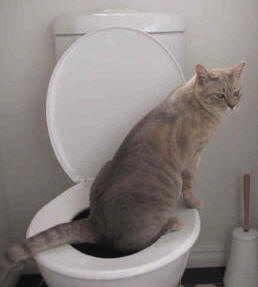Avoid Clogs and Damage: Don't Flush Cat Poop Down Your Toilet - Professional Recommendations
Avoid Clogs and Damage: Don't Flush Cat Poop Down Your Toilet - Professional Recommendations
Blog Article
We have noticed this post relating to Can You Flush Cat Poo or Litter Down the Toilet? below on the internet and thought it made sense to relate it with you on my blog.

Introduction
As cat proprietors, it's vital to bear in mind exactly how we deal with our feline friends' waste. While it might appear practical to flush pet cat poop down the toilet, this technique can have damaging effects for both the environment and human health.
Alternatives to Flushing
Luckily, there are safer and more accountable ways to take care of feline poop. Consider the adhering to options:
1. Scoop and Dispose in Trash
The most typical technique of getting rid of cat poop is to scoop it into a naturally degradable bag and throw it in the trash. Be sure to make use of a dedicated clutter inside story and throw away the waste promptly.
2. Use Biodegradable Litter
Choose biodegradable feline litter made from materials such as corn or wheat. These litters are eco-friendly and can be securely taken care of in the trash.
3. Bury in the Yard
If you have a lawn, take into consideration burying cat waste in a designated area away from veggie yards and water resources. Be sure to dig deep enough to avoid contamination of groundwater.
4. Mount a Pet Waste Disposal System
Buy a pet waste disposal system specifically developed for feline waste. These systems utilize enzymes to break down the waste, minimizing smell and ecological effect.
Health and wellness Risks
In addition to environmental concerns, flushing pet cat waste can likewise pose health and wellness dangers to humans. Feline feces might include Toxoplasma gondii, a parasite that can trigger toxoplasmosis-- a potentially severe health problem, particularly for expecting females and people with damaged body immune systems.
Environmental Impact
Flushing feline poop presents unsafe microorganisms and bloodsuckers into the supply of water, posturing a significant danger to water ecological communities. These impurities can adversely impact marine life and compromise water top quality.
Verdict
Accountable family pet ownership extends beyond giving food and shelter-- it additionally entails appropriate waste management. By avoiding purging pet cat poop down the bathroom and opting for alternative disposal methods, we can reduce our ecological footprint and shield human wellness.
Why You Should Never Flush Cat Poop Down the Toilet
A rose by any other name might smell as sweet, but not all poop is created equal. Toilets, and our sewage systems, are designed for human excrement, not animal waste. It might seem like it couldn’t hurt to toss cat feces into the loo, but it’s not a good idea to flush cat poop in the toilet.
First and foremost, assuming your cat uses a litter box, any waste is going to have litter on it. And even the smallest amount of litter can wreak havoc on plumbing.
Over time, small amounts build up, filling up your septic system. Most litter sold today is clumping; it is made from a type of clay that hardens when it gets wet. Ever tried to scrape old clumps from the bottom of a litter box? You know just how cement-hard it can get!
Now imagine just a small clump of that stuck in your pipes. A simple de-clogger like Drano isn’t going to cut it. And that means it’s going to cost you big time to fix it.
Parasitic Contamination
Believe it or not, your healthy kitty may be harboring a nasty parasite. Only cats excrete Toxoplasma in their feces. Yet it rarely causes serious health issues in the cats that are infected. Most people will be fine too if infected. Only pregnant women and people with compromised immune systems are at risk. (If you’ve ever heard how women who are expecting are excused from litter cleaning duty, Toxoplasma is why.)
But other animals may have a problem if infected with the parasite. And human water treatment systems aren’t designed to handle it. As a result, the systems don’t remove the parasite before discharging wastewater into local waterways. Fish, shellfish, and other marine life — otters in particular — are susceptible to toxoplasma. If exposed, most will end up with brain damage and many will die.
Depending on the species of fish, they may end up on someone’s fish hook and, ultimately on someone’s dinner plate. If that someone has a chronic illness, they’re at risk.
Skip the Toilet Training
We know there are folks out there who like to toilet train their cats. And we give them props, it takes a lot of work. But thanks to the toxoplasma, it’s not a good idea.

As a fervent person who reads about How to Dispose of Cat Poop and Litter Without Plastic Bags, I assumed sharing that article post was important. For those who liked our article plz remember to pass it around. We cherish reading our article about How to Dispose of Cat Poop and Litter Without Plastic Bags.
Call Today Report this page